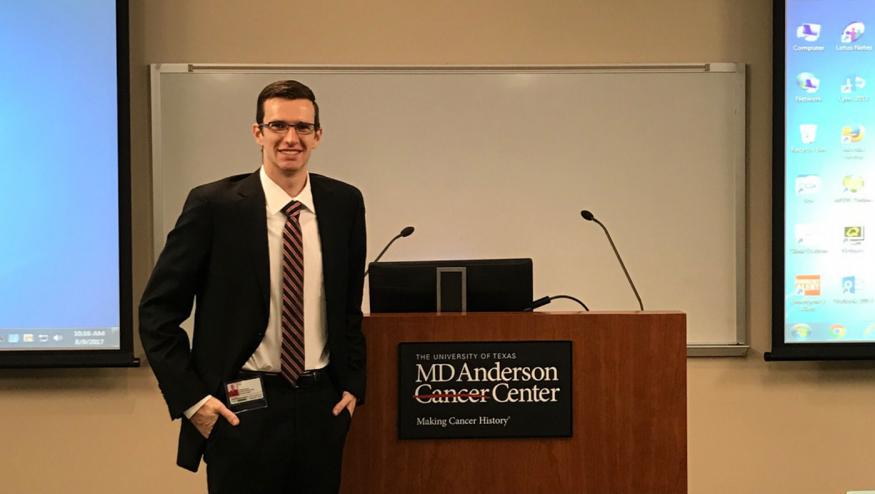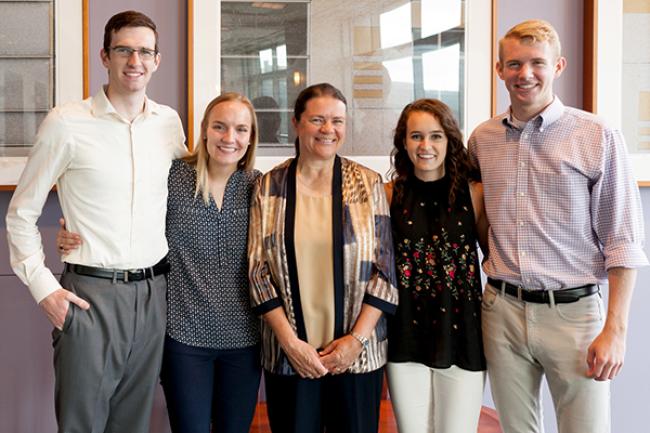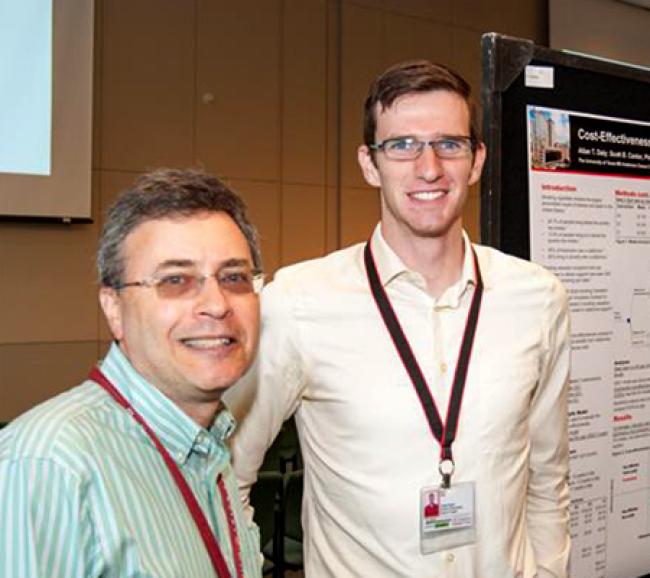
From theory to practice: Allan Daly’s decision making
Dr. Heidi Storl is one of the professors who reviews student applications for Augustana’s Texas Medical Center (TMC) Summer Research Internship program, and then sends them on to potential mentors at the renowned medical complex in Houston. The applications represent majors all across the liberal arts: biology of course, but also art, religion, psychology and many others.
This year an applicant stood out: Allan Daly ’18, with majors in mathematics and Classics, and an interest in decision theory. Storl, who directs the program and teaches philosophy at Augustana, sent it to just one person: Dr. Cantor at the top-ranked MD Anderson Cancer Center.
“Dr. Cantor is a Harvard-trained decision theorist, and he was interested in a student with the math skills—both applied and theoretical—and also with a twist,” she said. “In Allan’s case that twist was the fact that he was a Classics major.”

As Dr. Cantor put it, “That must make Allan a very interesting person.” And so a match was made.
Daly had come to Augustana knowing he’d pursue mathematics. The more math he took, the more he liked it. He also needed to study a language, so he chose Latin because “it was different.”
He fell in love with learning about the roots of the English language, and then with learning more about the history and culture of Ancient Greece and Rome.
“I found Classics by chance and decided to stick with it,” he said.
Decision theory and preparing for the internship
In the spring, Daly preferred theoretical or “pure” math over applied math. He is especially drawn to graph theory and decision theory.
“It’s the theory and study of how we decide what to do… whether it’s a rational decision or whether we do it for some other motivation,” Daley explained. “You can use those pure fields of mathematics in the real world,” he said, “but stats for example is more applied in its roots, so you can more immediately apply it to the real world.”
In his application for the TMC internship, Daley noted he would be interested in using math to decide where hospital resources go. Hospitals use graphs that plot the results of those decisions, but using decision theory could help with how to decide.
“When I was in discrete math I learned you could use decision theory to plot graphs on where hospital resources could be used… such as when you have an organ donor and you can plot out with a graph who should get that organ,” he said.
There are two layers of decision theory in the hospital setting, according to Daly. “You have to make sure it’s ethical, that you’re not favoring someone unfairly. For example, if you know somebody who is #10 on a list and you choose to make them #1 because you have a connection—or not choosing to give someone an organ because of race or gender.
“Once you have what makes the most sense logically and ethically, you have to work with a pricing model—what is most cost-efficient. For example, if it is too expensive for Decision A and you would have to go with Decision B, or if traveling meant it would make more sense to go with Decision B.
“I don’t think I’ll be the one deciding who gets organs; at least I hope not!” Daly said. He left for Houston in May, ready to apply his skills and interests to Dr. Cantor’s work.
Smoking, cell phones and a change in direction
Daly’s internship turned out to be different from what he expected. His research focused on smoking cessation programs that use cell phones to get people to quit.
Cell phones? “Most people have cell phones,” he said.
“In 2015 it was found that 15 percent of Americans smoked, but those in low-income populations reached 26 percent.* But 95 percent of Americans in 2015 owned cell phones and 92 percent of low-income people did.”**
‘How interesting… to study how addiction affects the brain, and how to help people overcome it.’
“We had a control group who received only advice and nicotine patches. Another group had moderate cell phone support, where participants had access to a smoking hotline and were enrolled in a text message system; they could text when they had an urge to smoke, and they would receive a message. Third level was the intensive one, which on top of everything else provided 11 over-the-phone counseling sessions with a counselor,” he explained.
Daly’s role was to build two models, one looking at the short-term outcomes of the programs, recording the cost to implement per each successful quit. The second looked at the long-term health benefits for the people who quit and predicted their remaining years in good health.
After a week or so he became really excited about researching the harms of smoking—to people’s health, well-being and finances. And he found that cell phones are effective at helping people quit.

“I realized how hard it is to quit smoking,” Daly said, “and that’s the whole point of studying addiction. How interesting… to study how addiction affects the brain, and how to help people overcome it.”
He found Dr. Cantor easy to work with. “He has a great sense of humor, but at the same time he wanted quality work. But I found it wasn’t hard to provide the quality work, because he would provide feedback on what he wanted when I showed him my work.”
His internship showed Daly that he enjoyed the experience of applying what he knew to real-life problems. Instead of pursuing more theoretical math after college, he is now thinking of applied math.
“I’ve revised my fall schedule to take computer science now and applied math later,” he said. “Also what I’m looking at for grad school isn’t just pure math, but also applied programs—especially math and medical decision science and/or public health.”
Daly is thankful for Dr. Storl, and all the wonderful people he met at MD Anderson Cancer Center. “Texas was a lot of fun. But the one thing I don’t miss is the humidity.”
*“Current Cigarette Smoking Among Adults–United States, 2005-2014,” Jamal et al, 2015, Centers for Disease Control and Prevention
** The Pew Research Center
The liberal arts and the Texas Medical Center internship program
According to Dr. Storl, proposing an internship partnership between Augustana and the Texas Medical Center was a great hurdle. To get an in with one of the largest and most prestigious medical complexes in the world, Storl presented an argument that liberal arts students would have special skills, gift and talents that other interns would lack.
Representatives at the MD Anderson Cancer Center were intrigued; they were the first of the 49 TMC institutions to give Augustana students a try. After a year of proof, Augustana became one of only a few colleges and universities to partner with the TMC on summer internships.
Dr. Storl understands why.
“I think the appeal is that studies in Classics or philosophy or religion actually enable students to see our world through a different set of lenses. The ways liberal arts students are able to frame the experiences that they have in their internships are different from the students who haven’t studied in the liberal arts. The liberal arts adds a certain depth and richness to the experience, and places it into a grand historical context.”
